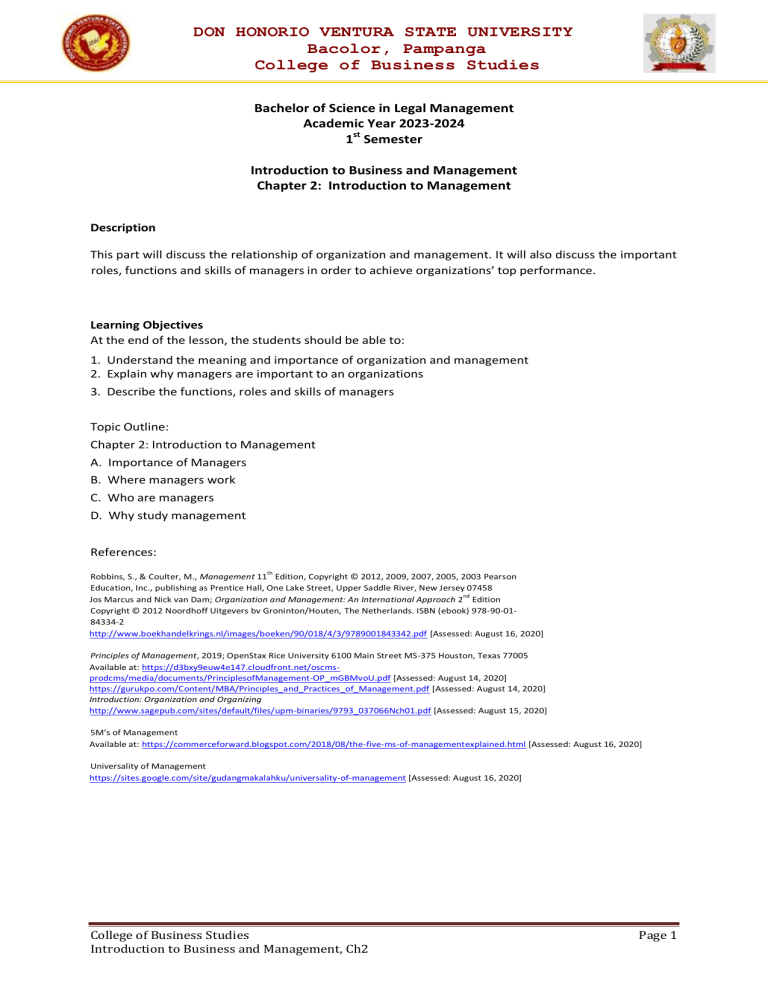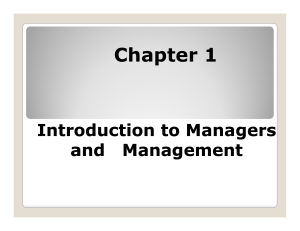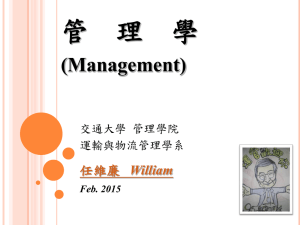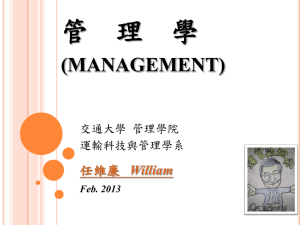
DON HONORIO VENTURA STATE UNIVERSITY Bacolor, Pampanga College of Business Studies Bachelor of Science in Legal Management Academic Year 2023-2024 1st Semester Introduction to Business and Management Chapter 2: Introduction to Management Description This part will discuss the relationship of organization and management. It will also discuss the important roles, functions and skills of managers in order to achieve organizations’ top performance. Learning Objectives At the end of the lesson, the students should be able to: 1. Understand the meaning and importance of organization and management 2. Explain why managers are important to an organizations 3. Describe the functions, roles and skills of managers Topic Outline: Chapter 2: Introduction to Management A. Importance of Managers B. Where managers work C. Who are managers D. Why study management References: th Robbins, S., & Coulter, M., Management 11 Edition, Copyright © 2012, 2009, 2007, 2005, 2003 Pearson Education, Inc., publishing as Prentice Hall, One Lake Street, Upper Saddle River, New Jersey 07458 nd Jos Marcus and Nick van Dam; Organization and Management: An International Approach 2 Edition Copyright © 2012 Noordhoff Uitgevers bv Groninton/Houten, The Netherlands. ISBN (ebook) 978-90-0184334-2 http://www.boekhandelkrings.nl/images/boeken/90/018/4/3/9789001843342.pdf [Assessed: August 16, 2020] Principles of Management, 2019; OpenStax Rice University 6100 Main Street MS-375 Houston, Texas 77005 Available at: https://d3bxy9euw4e147.cloudfront.net/oscmsprodcms/media/documents/PrinciplesofManagement-OP_mGBMvoU.pdf [Assessed: August 14, 2020] https://gurukpo.com/Content/MBA/Principles_and_Practices_of_Management.pdf [Assessed: August 14, 2020] Introduction: Organization and Organizing http://www.sagepub.com/sites/default/files/upm-binaries/9793_037066Nch01.pdf [Assessed: August 15, 2020] 5M’s of Management Available at: https://commerceforward.blogspot.com/2018/08/the-five-ms-of-managementexplained.html [Assessed: August 16, 2020] Universality of Management https://sites.google.com/site/gudangmakalahku/universality-of-management [Assessed: August 16, 2020] College of Business Studies Introduction to Business and Management, Ch2 Page 1 Introduction to Business and Management Chapter 2: Introduction to Management Organization and management is twin terms that exists side by side with each other, each one needs and supports the other. Organizations will be inert and useless if there is no management that will steer it; management will be hollow and meaningless if there’s no organization to manage. In the real world of administration, organization and management are essential elements through which human actions and objectives are carried out and accomplished. In a manner of speaking, organization and management become a means to an end. Why Managers are important “A great boss can change your life, inspiring you to new heights both professionally and personally, and energizing you and your team to together overcome new challenges bigger than any once of you could tackle”. Count yourself lucky if you had the opportunity to have worked with such manager. However, even managers who don’t live up with such criteria and expectations are important to an organization. Let’s look at the three (3) reasons why. • The first reason why managers are important is that organizations need their managerial skills and abilities more than ever in these uncertain, complex, and chaotic times. As organizations deal with today’s challenges – the worldwide economic climate, changing technology, increasing globalization, and so forth – managers play an important role in identifying critical issues and crafting responses. • The second reason why managers are important is that they’re critical to getting things done. For instance, a manager isn’t someone who will greet and set customers, take their orders, cook their meals, or prepare a table for another customer, but he/she was the person who creates and coordinates the workplace systems and conditions so that others can perform their jobs. His/her job as a manager is to ensure that all the employees are getting their jobs done so the organization can do what it’s in business to do. • Finally, managers do matter to organizations! Some reports have shown that the single most important variable in employee productivity and loyalty isn’t pay or benefits or workplace environment; it’s the quality of relationship between employees and their direct supervisors. Another reports also suggested that, the way a company manages and engages people can significantly affect its financial performance. Also, a recent study of organizational performance found that managerial ability was important in creating organizational value. From these reports we can conclude that managers are important and they do matter! Where do Managers work? It’s obvious that managers work in organizations. Organizations are defined differently by different authors. There are, however, certain essential elements that can be discerned from them. According to Scott and Mitchell as cited in Nigro 1989, “Formal Organizations are a system of coordinated activities of group of people working cooperatively toward a common goal under authority and leadership. An organization is a deliberate arrangement of people to accomplish some specific purpose. It can be conceptualized as collection of individuals deliberately structured within identifiable boundaries to achieve predetermined goals. College of Business Studies Introduction to Business and Management, Ch2 Page 2 Three characteristics of organization: Deliberate Structure Exhibit 1-1 Characteristics of an Organization Distinct People Purpose • Have a distinct purpose (goal) – this purpose is typically expressed through goals that the organization hopes to accomplish. • Social entity/people – it takes people to perform work that is necessary for the organization to achieve its goals. • Designated as deliberately structured and coordinated activity systems – that structure may be open and flexible, with no specific job duties or strict adherence to explicit job arrangements. Who are Managers? Managers may not be who or what you might expect! Managers can be young as 18 or over age of 80. They can run large corporations as well as entrepreneurial start-ups. They can found in the government departments, hospitals, small businesses, non-profit agencies, schools, museums, and even nontraditional organizations as political campaigns and music tours. It is used to be fairly simple to define who managers were: they were the organizational members who told others what to do and how to do it. Before, it was easy to differentiate managers form nonmanagerial employees, but not now. In many organizations, the changing nature of work has blurred the difference between managers and non-managerial employees. A manager is: Someone who coordinates and oversees the work of other people so the set organizational objectives can be achieve. A manager’s job is not about personal achievement – but about helping others do their work. He/she may have work duties not related to coordinating ad overseeing others’ work. An example, is that an insurance claims supervisor might process claims in addition to coordinating the work activities of other claims clerks. Managers may be classified as first-line, middle or top in a traditionally structured organizations. Levels of Management College of Business Studies Introduction to Business and Management, Ch2 Page 3 a. Top level managers They are responsible for making organization-wide decisions and establishing the plans and goals that affect the entire organization. They are responsible in controlling and overseeing the entire organization. These individuals typically have titles such as executive vice president, president, managing director, chief operating officer, or chief executive officer. b. Middle level managers They manage the work of first-line managers and can be found between the lowest and top levels of the organization. They devote their time to organizational and directional functions than top-level managers. Their roles can be emphasized as: executing organizational plans in conformance with company’s policies and objectives; define and discuss information and policies from top management to lower management; and most importantly, inspire and guide low-level managers towards better performance. They may have titles such as regional manager, project leader, store manager, or division manager. c. First-line managers They manage the work of non-managerial employees who typically are involved with producing the organization’s products or servicing the organization’s customers. They usually have responsibilities of assigning employees’ tasks, guiding employees on a day-to-day basis, and making suggestions and recommendation. First-line managers may be called supervisors, or even shift managers, district managers, department managers or office managers. What do Managers Do? Managing is one of the most important activities of human life. To accomplish aims that could not be achieved individually, people started forming groups. Managing has become essential to ensure coordination of individual efforts. Management applies to all kind of organizations and to managers to all organizational levels. Principles of management are now used not only for managing business but in all walks of life viz.., government, military, social and educational institutions. Management is the life giving element to any organization. There are many definitions given by some of the management experts are as follows: Henri Fayol: “Management is conduct of affairs of business, moving towards its objectives through a continuous process of improvement and optimization of sources”. Koontz: “Management is the process of designing and maintaining an environment in which individuals, working together in groups, efficiently accomplish selected aims”. Mary Parker Follet: “Management is the art of getting things done through people”. George R. Terry: “Management is a process consisting of planning, organizing, actuating, and controlling, performed to determine and accomplish the objectives by use of people and resources”. Management involves coordinating and overseeing the work activities of others so that their activities are completed efficiently and effectively. It ensures that work activities are completed efficiently and effectively by the people responsible for doing them, or at least that’s what managers aspire to do. Simply speaking, management is what managers do. College of Business Studies Introduction to Business and Management, Ch2 Page 4 EFFICIENCY - Efficiency measures the relationship between inputs and outputs, or how successfully the inputs have transformed into outputs. - Often referred to “doing things right” – it is getting the most output from the least amount of inputs. Because managers deal with scare inputs including resources such as people, money and equipment. - Emphasize on input and output; focuses on the process EFFECTIVENESS - It measures the degree to which a business achieve its goals or the way outputs interact with the economic and social environment. Zheng, 2010, stated that effectiveness determines the policy objectives of the organization. - It is often described as “doing the right things”- that is, doing those work activities that will help the organization to achieve its goals. - Emphasize on means and ends; focuses on the result - Measures if actual output meets desired output Ideally, individuals and companies find ways to become efficient and effective, but it is possible to be efficient but not effective – and vice versa. For example, if a company is not doing well it may decide to train its workforce to use a new technology. The training may go well, with employees learning the new technology in record time, but if the overall productivity doesn’t improve following the implementation of this new technology, the company’s strategy was efficient but not effective. Efficiency and Effectiveness In Management College of Business Studies Introduction to Business and Management, Ch2 Page 5 In a successful organization, high efficiency and high effectiveness typically go hand in hand. Poor management usually involves being inefficient and ineffective or being efficient, but ineffective. Describing what managers do isn’t easy. Just as no two organizations are alike, no two managers’ jobs are the same. In spite of this, management researchers have developed three approaches to describe what managers do: functions, roles, and skills. Management Functions According to the functions approach, managers perform certain activities or functions as they efficiently and effectively coordinate the works of others. Henri Fayol, a French businessman, first proposed in the early part of the twentieth century that all managers perform five functions: planning, organizing, commanding, coordinating, and controlling. Today these five functions were condensed into four: planning, organizing, leading, and controlling. Functions of Management PLANNING Management function that involves setting goals, establishing strategies for achieving those goals, and developing plans to integrate and coordinate activities. ORGANIZING Management function that involves arranging and structuring work to accomplish the organization’s goals. When managers organize, they determine what tasks are to be done, who is to them, how the tasks are to be grouped, who reports to whom, and where the decisions are to be made. LEADING Management function that involves working with and through people to accomplish organizational goals. When managers motivate subordinates, help resolve work group conflicts, influence individuals or teams as they work, select the most effective communication channel, or deal in any way with employee behavior issues, they are leading. CONTROLLING After goals and plans are set, tasks and structural arrangements put in place, and people hired, trained and motivated, there has some evaluation of whether things are going as planned. Managers must monitor and evaluate performance to ensure that goals are being met and job is being done as it should be. Controlling involves monitoring, comparing, and correcting work performance. In reality, what a manager does may not always happen in sequence. Regardless of the order in which these functions are performed, however, the fact that managers plan, organize, led and control as they manage. College of Business Studies Introduction to Business and Management, Ch2 Page 6 An argument was made that there is another perspective on describing what managers really do. Mintzberg’s Managerial Roles and a Contemporary Model of Managing Henry Mintzberg, a well-known management researcher, studied actual managers at work. In his first comprehensive study, Mintzberg concluded that what managers do can best be described by looking at the managerial roles they engage in at work. The term managerial roles refers to specific actions or behaviors expected of and exhibited by a manager. (Think of the different roles you play—such as student, employee, student organization member, volunteer, sibling, and so forth—and the different things you’re expected to do in these roles.) When describing what managers do from a roles perspective, we’re not looking at a specific person per se, but at the expectations and responsibilities that are associated with being the person in that role— the role of a manager. These 10 roles are grouped around interpersonal relationships, the transfer of information, and decision making. The interpersonal roles are ones that involve people (subordinates and persons outside the organization) and other duties that are ceremonial and symbolic in nature. The three interpersonal roles include figurehead, leader, and liaison. The informational roles involve collecting, receiving, and disseminating information. The three informational roles include monitor, disseminator, and spokesperson. Finally, the decisional roles entail making decisions or choices. The four decisional roles include entrepreneur, disturbance handler, resource allocator, and negotiator. As managers perform these roles, Mintzberg proposed that their activities included both reflection (thinking) and action (doing). Involves collecting, receiving disseminating Entail making choices or decision Involves with people and duties that are ceremonial Exhibit-5 Henry Mintzberg’s 10 Managerial symbolic in Recently, Mintzberg completed another-hands-on and up-close study of managers at work and concluded that, “Basically, managing is about influencing action. It’s about helping organization and units to get things done, which means action”. Based on his observations, Mintzberg went on to explain that a manager does this in three (3) ways: • • By managing actions directly (for instance, negotiating contracts, managing projects, etc.) By managing people who take action (for example, motivating them, building teams, enhance the organization’s culture, etc.) College of Business Studies Introduction to Business and Management, Ch2 Page 7 • By managing information that propels people to take action (using budgets, goals, task delegation, etc) The manager at the center of the model has two roles – framing, which defines how a manager approaches his or her job; and scheduling, which “brings the frame to life” through the distinct tasks the manager does. The manager enacts these roles while managing action in the three “planes”: with information, through people, and sometimes by taking action directly. It’s an interesting perspective on the manager’s job and that adds to our understanding of what is that managers do. Management Skills Dell Inc. is a company that understands the importance of management skills, it started an intensive five-day offsite skills training program for first-line managers as a way to improve its operations. One of Dell’s directors of learning and development thought this was the best way to develop, “leaders who can build that strong relationship with their front–line employees”. What have the supervisors learned from the skills training? Some things they mentioned were how to communicate more effectively and how to refrain from jumping to conclusions when discussing with a worker. Robert L. Katz is an American social and organizational psychologist. He created the concept of managerial skills, which describes how the required skills structure changes, depending on the management level. What types of skills do managers need? Robert L. Katz proposed that managers need three critical skills in managing: technical, human, and conceptual. Technical Skills Are specific job knowledge and techniques needed to proficiently perform work task. These skills tend to be more important for first-line managers because they typically are managing employees who use tools and techniques to produce the organization’s products or service the customers. Having appropriate technical skills signify that the person is competent and knowledgeable with respect to the activities specific to an organization, the organization’s rules, and standard operating procedures, and the organization’s product and services. Example: In accounting firm, technical skill might include understanding of generally accepted accounting principles, knowledge of commercial laws, and knowledge of tax laws, etc. A manager who has technical skills, also recognizes the importance of human skills. Human Skill it relates to the ability to work with people both individually and in group. Because all managers deal with people, these skills are equally important to all levels of management. Managers with good human skills get the best out of their people. They know to motivate, communicate, lead and inspire enthusiasm and trust. Some human skills that are generally considered important are effective communication (both verbal and written), motivating others and creation of a positive attitude, development of cooperation and team spirit etc. Conceptual Skills These are skills managers use to think and conceptualize about abstract and complex situations. Using these skills, managers see the organization as a whole, understand the relationships among various subunits, and visualize how the organization fits into its broader environment. These skills are most important to top managers. Some conceptual skills that are generally important are creativity, decision-making, wing to wing interconnectedness, thinking as a whole, strategic thinking, problem-solving, etc. It will also be disastrous for organizations not to properly and effectively organize the 5 M’s for the organization’s success. College of Business Studies Introduction to Business and Management, Ch2 Page 8 Important Managerial Skills Structural Elements (5 M’s) of Management Men Money Material Management Machines Methods 1. Money – it is the most critical and all-purpose resource because it used to acquire or hire other resources. In organization, money is employed to generate more in the forms of profit or income. 2. Manpower – it refers to the managerial and non-managerial personnel employed in an organization. Other resources cannot act by themselves and have to be utilized by human beings. Human resources mobilize, utilize and allocate physical and financial resources of the organization. 3. Materials – represent the physical raw materials and intermediate products which are converted and/or assembled into finished products with the help of certain process and technology. 4. Machinery – machines are the equipment used to process the materials into semi-finished or finished products. With the used of modern machinery, they help to improve quality and reduce cost so they become an important ingredient in the efficient management of management. 5. Methods – refers to the normal and prescribed way of doing things. Various operations are performed according to certain systems and procedures. Use of right methods contribute to increase in efficiency of operations and contributes to effective management. It is the duty of the management or managers to understand the basic nature and functions of each M and the source of availability. Managers must clearly know the purposes of which the other factors are employed and coordinated to optimize their combined productivity. College of Business Studies Introduction to Business and Management, Ch2 Page 9 Why Study Management? The universality of management is an important concept in the modern management thought. When describing management as universal, we refer to the widespread practice of management in all types of organizations and we want to find ways to improve the way organizations are managed. Universal Need for Management Management is universally needed in all organizations, so we want to find ways to improve the way organizations are managed. Why? Because we interact with organizations every single day. Are you frustrated when you have to spend two hours of waiting in a government office just waiting for the releasing of your driver’s license? Are you irritated when none of the sales-people in a retail store seems interested in helping you? These scenarios show problems created by poor management. Organizations that are well managed – develop a loyal customer base, grow, and prosper, even during challenging times. By studying management, you’ll be able to recognize poor management and work to get it corrected. Another reason of studying management, is the reality that you will either manage or be managed. For those who plan to be managers, an understanding of management forms the foundation upon which to build your management skills. Summary of Learning Outcomes Managers are important to organizations for three reasons. First, organizations need their managerial skills and abilities in uncertain complex, and chaotic times. Second, managers are critical to getting things done in organizations. Finally, managers contribute to employee productivity and loyalty; the way employees are managed can affect the organization’s financial performance; and managerial ability has been shown to be important in creating organizational value. Managers coordinate and oversee the work of other people so that the organizational objectives can be achieved. In a traditional structured organizations, managers can be first-line, middle, or top. Management is what managers do and management involves coordinating and overseeing the efficient and effective completion of other’s work activities. Efficiency means doing things right and effectiveness means doing the right things. The four functions of management, Mintzberg’s managerial roles and Katz’s managerial skills can be adapted and use in managing organizations and the importance of studying management. College of Business Studies Introduction to Business and Management, Ch2 Page 10




